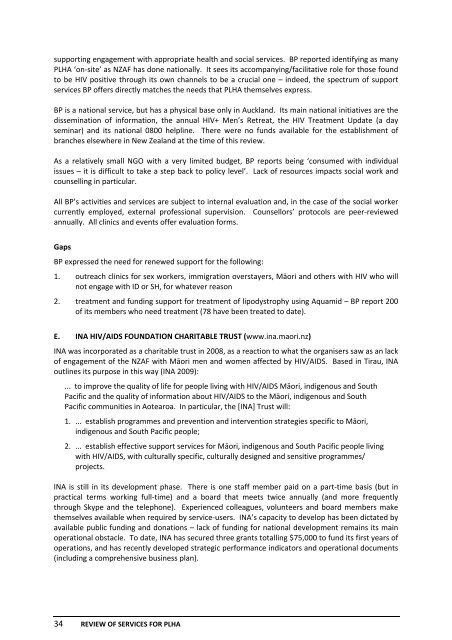Review of services for people living with HIV in New Zealand
Review of services for people living with HIV in New Zealand
Review of services for people living with HIV in New Zealand
- No tags were found...
You also want an ePaper? Increase the reach of your titles
YUMPU automatically turns print PDFs into web optimized ePapers that Google loves.
support<strong>in</strong>g engagement <strong>with</strong> appropriate health and social <strong>services</strong>. BP reported identify<strong>in</strong>g as manyPLHA ‘on‐site’ as NZAF has done nationally. It sees its accompany<strong>in</strong>g/facilitative role <strong>for</strong> those foundto be <strong>HIV</strong> positive through its own channels to be a crucial one – <strong>in</strong>deed, the spectrum <strong>of</strong> support<strong>services</strong> BP <strong>of</strong>fers directly matches the needs that PLHA themselves express.BP is a national service, but has a physical base only <strong>in</strong> Auckland. Its ma<strong>in</strong> national <strong>in</strong>itiatives are thedissem<strong>in</strong>ation <strong>of</strong> <strong>in</strong><strong>for</strong>mation, the annual <strong>HIV</strong>+ Men’s Retreat, the <strong>HIV</strong> Treatment Update (a daysem<strong>in</strong>ar) and its national 0800 helpl<strong>in</strong>e. There were no funds available <strong>for</strong> the establishment <strong>of</strong>branches elsewhere <strong>in</strong> <strong>New</strong> <strong>Zealand</strong> at the time <strong>of</strong> this review.As a relatively small NGO <strong>with</strong> a very limited budget, BP reports be<strong>in</strong>g ‘consumed <strong>with</strong> <strong>in</strong>dividualissues – it is difficult to take a step back to policy level’. Lack <strong>of</strong> resources impacts social work andcounsell<strong>in</strong>g <strong>in</strong> particular.All BP’s activities and <strong>services</strong> are subject to <strong>in</strong>ternal evaluation and, <strong>in</strong> the case <strong>of</strong> the social workercurrently employed, external pr<strong>of</strong>essional supervision. Counsellors’ protocols are peer‐reviewedannually. All cl<strong>in</strong>ics and events <strong>of</strong>fer evaluation <strong>for</strong>ms.GapsBP expressed the need <strong>for</strong> renewed support <strong>for</strong> the follow<strong>in</strong>g:1. outreach cl<strong>in</strong>ics <strong>for</strong> sex workers, immigration overstayers, Māori and others <strong>with</strong> <strong>HIV</strong> who willnot engage <strong>with</strong> ID or SH, <strong>for</strong> whatever reason2. treatment and fund<strong>in</strong>g support <strong>for</strong> treatment <strong>of</strong> lipodystrophy us<strong>in</strong>g Aquamid – BP report 200<strong>of</strong> its members who need treatment (78 have been treated to date).E. INA <strong>HIV</strong>/AIDS FOUNDATION CHARITABLE TRUST (www.<strong>in</strong>a.maori.nz)INA was <strong>in</strong>corporated as a charitable trust <strong>in</strong> 2008, as a reaction to what the organisers saw as an lack<strong>of</strong> engagement <strong>of</strong> the NZAF <strong>with</strong> Māori men and women affected by <strong>HIV</strong>/AIDS. Based <strong>in</strong> Tirau, INAoutl<strong>in</strong>es its purpose <strong>in</strong> this way (INA 2009):... to improve the quality <strong>of</strong> life <strong>for</strong> <strong>people</strong> <strong>liv<strong>in</strong>g</strong> <strong>with</strong> <strong>HIV</strong>/AIDS Māori, <strong>in</strong>digenous and SouthPacific and the quality <strong>of</strong> <strong>in</strong><strong>for</strong>mation about <strong>HIV</strong>/AIDS to the Māori, <strong>in</strong>digenous and SouthPacific communities <strong>in</strong> Aotearoa. In particular, the [INA] Trust will:1. ... establish programmes and prevention and <strong>in</strong>tervention strategies specific to Māori,<strong>in</strong>digenous and South Pacific <strong>people</strong>;2. ... establish effective support <strong>services</strong> <strong>for</strong> Māori, <strong>in</strong>digenous and South Pacific <strong>people</strong> <strong>liv<strong>in</strong>g</strong><strong>with</strong> <strong>HIV</strong>/AIDS, <strong>with</strong> culturally specific, culturally designed and sensitive programmes/projects.INA is still <strong>in</strong> its development phase. There is one staff member paid on a part‐time basis (but <strong>in</strong>practical terms work<strong>in</strong>g full‐time) and a board that meets twice annually (and more frequentlythrough Skype and the telephone). Experienced colleagues, volunteers and board members makethemselves available when required by service‐users. INA’s capacity to develop has been dictated byavailable public fund<strong>in</strong>g and donations – lack <strong>of</strong> fund<strong>in</strong>g <strong>for</strong> national development rema<strong>in</strong>s its ma<strong>in</strong>operational obstacle. To date, INA has secured three grants totall<strong>in</strong>g $75,000 to fund its first years <strong>of</strong>operations, and has recently developed strategic per<strong>for</strong>mance <strong>in</strong>dicators and operational documents(<strong>in</strong>clud<strong>in</strong>g a comprehensive bus<strong>in</strong>ess plan).34 REVIEW OF SERVICES FOR PLHA
















